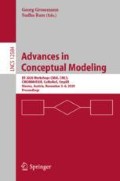Abstract
Validating and debugging conceptual models is a very time-consuming task. Though separate software tools for model validation and machine learning are available, their integration for an automated support of the debugging-validation process still needs to be explored. The synergy between model validation for finding intended/unintended conceptual models instances and machine learning for suggesting repairs promises to be a fruitful relationship. This paper provides a preliminary description of a framework for an adequate automatic support to engineers and domain experts in the proper design of a conceptual model. By means of a running example, the analysis will focus on two main aspects: i) the process by which formal, tool-supported methods can be effectively used to generate negative and positive examples, given an input conceptual model; ii) the key role of a learning system in uncovering error-prone structures and suggesting conceptual modeling repairs.
Access this chapter
Tax calculation will be finalised at checkout
Purchases are for personal use only
Notes
- 1.
For a detailed analysis of model checking and model finding see [10].
- 2.
From now on we use the terms “simulation run” and “configuration” interchangeably, where a simulation run is the result of an interpretation function satisfying the conceptual model. In other words: if we take the UML diagram as a M1-model (in the MDA-sense), a configuration is a M0-model that could instantiate that M1-model; if we take the UML diagram as a logical specification, then a configuration is a logical model of that specification. Finding these valid configurations given a specification is the classical task performed by a model finder.
- 3.
This step may require a previous conversion step, from the language used to design the conceptual model (e.g. UML, OntoUML) to the model finder specifications as in, e.g., [4].
- 4.
Notice that Alloy produces ‘0’ and ‘1’ instances only, we numbered the instances considering the full list of possible configurations.
References
Agrawal, R., Imieliński, T., Swami, A.: Mining association rules between sets of items in large databases. In: 1993 ACM SIGMOD, pp. 207–216 (1993)
Alrajeh, D., Kramer, J., Russo, A., Uchitel, S.: Elaborating requirements using model checking and inductive learning. IEEE TSE 39(3), 361–383 (2013)
Alrajeh, D., Kramer, J., Russo, A., Uchitel, S.: Automated support for diagnosis and repair. Commun. ACM 58(2), 65–72 (2015)
Braga, B.F., Almeida, J.P.A., Guizzardi, G., Benevides, A.B.: Transforming OntoUML into Alloy: towards conceptual model validation using a lightweight formal method. Innovat. Syst. Softw. Eng. 6(1–2), 55–63 (2010)
Cairns-Smith, A.G.: The Life Puzzle: On Crystals and Organisms and on the Possibility of a Crystal as an Ancestor. University of Toronto Press, Toronto (1971)
Guerson, J., Sales, T.P., Guizzardi, G., Almeida, J.P.A.: Ontouml lightweight editor: a model-based environment to build, evaluate and implement reference ontologies. In: 19th IEEE EDOC (2015)
Guizzardi, G.: Ontological foundations for structural conceptual models. Telematica Instituut/CTIT (2005)
Guizzardi, G.: Theoretical foundations and engineering tools for building ontologies as reference conceptual models. Semant. Web 1(1, 2), 3–10 (2010)
Guizzardi, G., Sales, T.P.: Detection, simulation and elimination of semantic anti-patterns in ontology-driven conceptual models. In: Yu, E., Dobbie, G., Jarke, M., Purao, S. (eds.) ER 2014. LNCS, vol. 8824, pp. 363–376. Springer, Cham (2014). https://doi.org/10.1007/978-3-319-12206-9_30
Jackson, D.: Software Abstractions: Logic, Language, and Analysis. MIT Press, Cambridge (2012)
Karegowda, A.G., Manjunath, A., Jayaram, M.: Comparative study of attribute selection using gain ratio and correlation based feature selection. Int. J. Inf. Technol. Knowl. Manage. 2(2), 271–277 (2010)
Kramer, S., Lavrač, N., Flach, P.: Propositionalization approaches to relational data mining. In: DŽeroski, S., Lavrač, N. (eds.) Relational Data Mining, pp. 262–291. Springer, Heidelberg (2001). https://doi.org/10.1007/978-3-662-04599-2_11
Muggleton, S., De Raedt, L.: Inductive logic programming: theory and methods. J. Log. Program. 19, 629–679 (1994)
Sales, T.P., Guizzardi, G.: Ontological anti-patterns: empirically uncovered error-prone structures in ontology-driven conceptual models. Data Knowl. Eng. 99, 72–104 (2015)
Tufféry, S.: Data Mining and Statistics for Decision Making. Wiley, Hoboken (2011)
Verdonck, M., Gailly, F.: Insights on the use and application of ontology and conceptual modeling languages in ontology-driven conceptual modeling. In: Comyn-Wattiau, I., Tanaka, K., Song, I.-Y., Yamamoto, S., Saeki, M. (eds.) ER 2016. LNCS, vol. 9974, pp. 83–97. Springer, Cham (2016). https://doi.org/10.1007/978-3-319-46397-1_7
Author information
Authors and Affiliations
Corresponding authors
Editor information
Editors and Affiliations
Rights and permissions
Copyright information
© 2020 Springer Nature Switzerland AG
About this paper
Cite this paper
Fumagalli, M., Sales, T.P., Guizzardi, G. (2020). Towards Automated Support for Conceptual Model Diagnosis and Repair. In: Grossmann, G., Ram, S. (eds) Advances in Conceptual Modeling. ER 2020. Lecture Notes in Computer Science(), vol 12584. Springer, Cham. https://doi.org/10.1007/978-3-030-65847-2_2
Download citation
DOI: https://doi.org/10.1007/978-3-030-65847-2_2
Published:
Publisher Name: Springer, Cham
Print ISBN: 978-3-030-65846-5
Online ISBN: 978-3-030-65847-2
eBook Packages: Computer ScienceComputer Science (R0)

